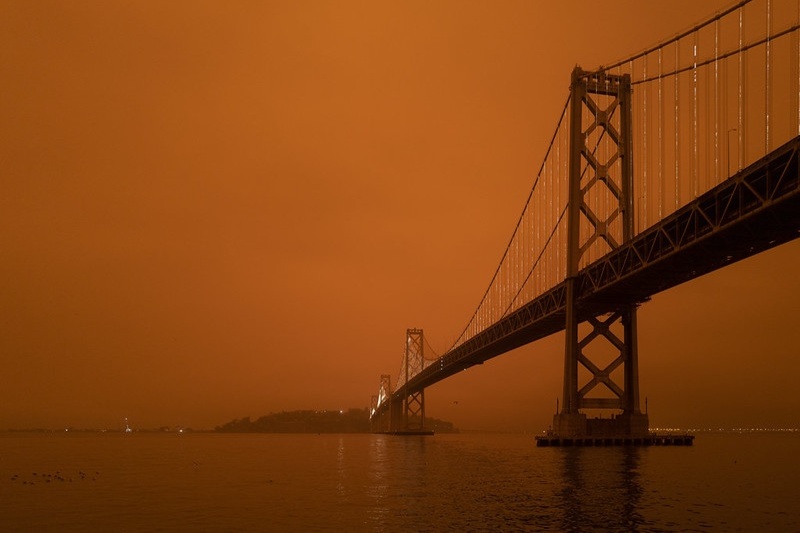
Fire, floods, famine: When will we act on climate?
The wildfires in California are a sign that the climate crisis is coming for both rich and poor countries. But how many more signs do we need before we take serious action?
The ominous, headache-red of the sky over California is like something from a post-apocalyptic film. Wildfires have burned more than 4 million acres in the region this year, killing at least 35 people with dozens more missing. Thousands have had to flee, leaving houses and possessions to the flames. The wreckage of their homes now lies under drifts of grey ash, while they breathe in toxic smoke.
Wildfires are not unexpected in this part of the world – but these are not even close to the scale of a routine burn. The blazes include six of the ten largest wildfires in California’s history, official figures show. Extreme phenomena such as fire tornados are occurring, not in isolation, but again and again.
These fires are not burning in remote forests but threatening cities. Entire towns have been razed to the ground, and the pall of smoke is causing a serious health risk across the western US.
The conditions for this have been building as the climate crisis progresses: over half of California, and more than 95% of Oregon, Colorado, Utah, Arizona, and New Mexico are currently in drought. In the aptly named Death Valley in California, what may have been the world’s highest ever temperature of 54.4°C was recorded this year. The signs were all pointing the same way.
Rich and poor
The loss and grief felt in the western US right now is known to many across the world as the climate crisis builds. Indeed, many poorer countries that are suffering similar symptoms of global heating are facing a much higher human toll, as their governments struggle to cope.
Just this month, Sudan was forced to declare a state of emergency, as the Nile River reached its highest levels in over 100 years, washing away entire villages, ruining farms and uprooting lives. Almost a hundred people have died, and over half a million have been displaced and are now facing poverty, violence, and the loss of their homes.
In May, Bangladesh’s most intense cyclone in two decades — Cyclone Amphan – devastated villages, destroying the homes of half a million people. By July, a third of the country was underwater after flooding caused by the heaviest rains in ten years, affecting 1.5 million people. Now those same people, starting again having lost homes, savings and loved ones, are some of the most at risk of the Covid-19 pandemic.
Yet these are just a handful of the most recent examples, there are thousands of heart-rending stories from around the world and will be thousands more as the climate crisis deepens. The question is, when will we start listening?
Wake up
We cannot avoid all the consequences of our addiction to fossil fuels, much is still to come, but there are great strides we could make, countless lives that could be saved, if we act now.
We need to move quickly. All nations, but rich countries especially – those that have benefitted from carbon-intensive development – need to step up. The full ambition of the Paris Agreement must be realised to achieve a wholesale transformation to a zero-carbon economy. The drastic reduction in the cost of renewable energy means the case for ending the use of fossil fuels – environmental, economic, humanitarian – is unequivocal. A global shift to renewable energy would see economic, social and environmental benefits for all countries.
The blood-red skies of California look like something from a post-apocalyptic film. But our world is still pre-apocalyptic. We can keep it that way: If we act now. Get involved and play your part in saving all our futures.
This article was originally published by The Ecologist and is reposted with permission
Image © Christopher Michel | Flickr
SIGN UP FOR OUR EMAILS AND STAY UP TO DATE WITH EJF